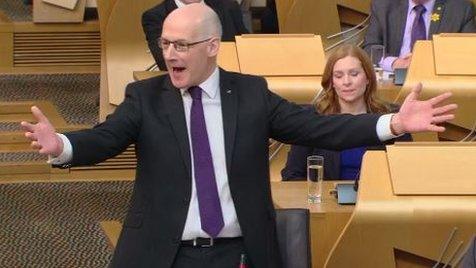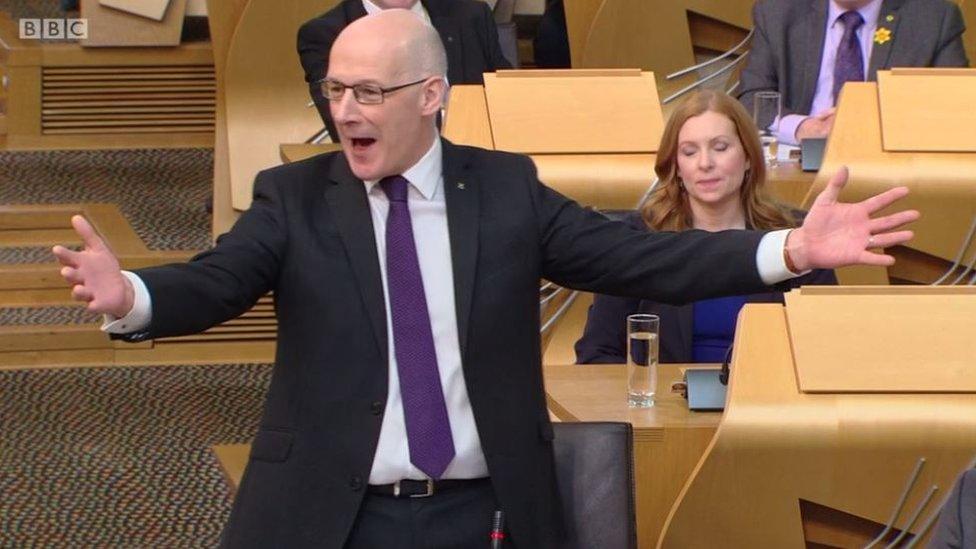FMQs: Sidestepping questions amid a roar of support
- Published
It was a lively First Minister's Questions with John Swinney stepping in for Nicola Sturgeon
The response from the SNP benches? Bravissimo. The response from rivals? Braggadocio. Either way, John Swinney set sundry pulses racing as he deputised at First Minister's Questions.
It was a magnificent performance, a rhetorical triumph. All around Mr Swinney could be heard the raucous ruckus of desks being banged and thighs being slapped. (Ok, maybe not the last bit.)
And what had prompted this outpouring of emotion? Had Mr Swinney discovered the secret to life, the universe and everything? He had not.
(Incidentally, while we are on the subject of the glorious Hitchhiker's Guide to the Galaxy, perhaps the anthem for the remaining 27 post Brexit should be "So long and thanks for all the fish!")
Had Mr Swinney rediscovered his inner Jambo and warmly backed the mighty United in a contest tomorrow evening against another Edinburgh outfit? That will undoubtedly come later.
No, what John S. contrived to do was to sidestep a question. Twice. But he did so with such panache and chutzpah that he had them roaring.
To recap. Two BBC interviews have caused a bit of a stushie in polite - and no doubt impolite - political circles.
In one, Andrew Wilson, who chairs the SNP's economic growth commission, said that North Sea oil had helped form the core of the independence offer in 2014. And that such would no longer be possible, given the subsequent decline in oil revenues.
In another, the First Minister was asked re speculation that indyref2 will occur in autumn 2018. (Said speculation being stoked by, among others, one A. Salmond of Strichen who has declared "game on" for that date.)
Nicola Sturgeon was interviewed by BBC political editor Laura Kuenssberg
Ms Sturgeon said it was "common sense" that the window of opportunity was around that time, given that it was necessary to await the emerging shape of Brexit in order to offer a credible counterpoise. However, she declined to specify anything, including whether there will be a further plebiscite.
Nevertheless, both issues - oil and independence - confronted Mr Swinney. (Ms Sturgeon being absent for a very good reason. She was attending the official Royal ceremony in London to commemorate the conflicts in Iraq and Afghanistan.)
In essence, both Ruth Davidson for the Tories and Kezia Dugdale for Labour said that the oil wealth was all but dry, that the case for independence was fatally undermined - and that the SG should dump all thoughts of indyref2.
Faced by the initial questions from Ms Davidson, Mr Swinney stalled cleverly. Had oil been a bonus for Scotland, demanded Ms D? It had certainly been a bonus for the UK, retorted Mr Swinney, plainly implying that this largesse had been wickedly extorted from the people of Scotland.
But, when Ms Dugdale piled in with a very similar approach, Mr Swinney ascended to a new order of rhetoric. It was all, he implied, eerily familiar for those who remembered the Better Together campaign in 2014.
"They've come back together again!", he roared in mock approbation. "It's like they've never had a moment apart!"
People will decide
Did it work? As a rhetorical device, absolutely. Game, set and, what's more, match to Swinney, J. Did he answer the question about North Sea oil? No. Except that point about the Brucie Bonus for Britain.
In a referendum campaign, it might be somewhat more difficult to get by solely on soaring rhetoric.
Nationalists would instead rely upon a combination of: castigating the UK for squandering the oil; accusing Unionists of misleading Scotland over the EU; and arguing that Scotland's fundamental economy remains robust, with potential to grow under independence.
Are we heading for another referendum? Looks like it - but then regular readers of these musings will be thoroughly familiar with that forecast.
Would it be different? Yes - and not only for the supporters of independence. For one thing, it seems highly unlikely - to adapt the FM's formulation - that Labour and the Tories would campaign together in a conjoined team.
However, one thing would be unchanged. The people would decide the outcome.
- Published6 March 2017

- Published9 March 2017
